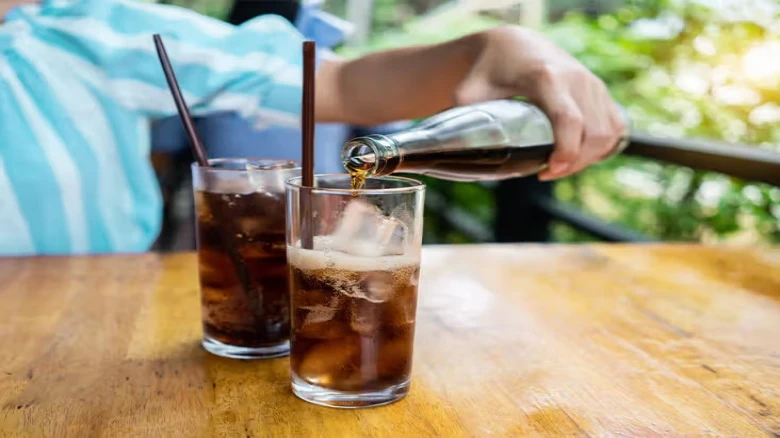Article

In older women, drinking one or more sugar-sweetened beverages per day is linked with an increased risk of liver cancer...
Digital Desk: A recent study indicates that drinking one or more sugar-sweetened beverages per day is related to a considerably greater incidence of liver cancer and death from chronic liver disease in older women.
The study, published in the medical journal JAMA last month, comprised almost 100,000 postmenopausal women, their self-reported sugar-sweetened beverage use, and the rate of liver cancer and chronic liver disease mortality over 20 years.
In the study, 7% of women reported drinking one or more sugary beverages daily; these women had an 85% increased risk of liver cancer and a 68% increased risk of chronic liver disease mortality as compared to persons who drank less than three sugar-sweetened beverages per month.
"To the best of our knowledge, this is the first study to report an association between sugar-sweetened beverage intake and chronic liver disease mortality," said Longgang Zhao, PhD, of Brigham's Channing Division of Network Medicine, in a news release.
"Our findings, if confirmed, may pave the way for a public health strategy to reduce the risk of liver disease based on data from a large and geographically diverse cohort," he added.
Here's what you need to know about the new study, as well as how to cut back on sugary drinks to lower your risk of liver cancer and chronic liver disease:
Approximately 65% of adults in the United States use sugar-sweetened beverages daily.
At the same time, the prevalence of liver cancer has more than tripled since 1980, with fatality rates more than double. There is also a significant prevalence of chronic liver disease worldwide, which can lead to liver cancer and death.
"Intake of sugar-sweetened beverages, a postulated risk factor for obesity, diabetes, and cardiovascular disease, may drive insulin resistance and inflammation, which are strongly implicated in liver carcinogenesis and liver health," Zhao said in a statement with senior study author Xuehong Zhang, ScD, associate professor of medicine at Harvard Medical School and associate epidemiologist at Brigham and Women's Hospital.
Researchers also investigated the impact of drinking artificially sweetened beverages on both liver cancer and chronic liver disease mortality but discovered no link between the two.
Despite the large increase in risk, experts say the mechanisms underlying the link between sugary drinks and liver cancer or chronic liver disease death are yet unknown.
"It's important to understand that this is not a causal relationship," Eleonora Teplinsky, MD, a medical oncologist at Valley Health System and a member of Sermo's medical advisory board, stated.
"More research is needed to validate these findings and understand the potential mechanisms behind the increased risk," it added.
How sugary drinks may lead your life to culminate- Read here
"Higher intake of sugary drinks may influence liver diseases through its effect on overweight and obesity onset, a strong risk factor for liver diseases," study authors wrote, adding that there's also a link between excess sugar and fat storage in the liver, which can eventually lead to healthy liver cells being replaced with fat cells.
When the investigators of the research asked participants to report their sugar-sweetened drinks, they made it clear that they only wanted to know about ordinary soft drinks (not diet) and fruit drinks like Tang®, Kool-Aid®, Hi-C®, or other fruit drinks that did not include fruit juice.
Kristin Kirkpatrick, a nutritionist at the Cleveland Clinic Department of Wellness & Preventive Medicine and author of Skinny Liver and the upcoming Regenerative Health, explains that a sugar-sweetened beverage is any drink that has sugar listed as its main ingredient. This includes sports drinks, energy drinks, bottled coffees and teas, and more.
Brown sugar, corn sweetener, corn syrup, dextrose, fructose, glucose, honey, lactose, malt syrup, maltose, molasses, raw sugar, and sucrose are other sugar sources to look for you on the labels.
The findings of this study cannot definitively explain whether it is ever too late to stop drinking sugary beverages. "While we lack direct insights into whether stopping a sugary beverage diet has time limitations, further research is required to establish such connections definitively," the study's authors stated.
Here's how researchers stated in their study to look out for prevention:
"However, based on current research indicating the negative impact of sugary drinks on obesity and diabetes, it's never too late to make positive dietary changes, including reducing or eliminating sugar-sweetened beverages," they mentioned.
"Drinking water over a sugar-sweetened beverage is always preferred," Teplinksy stated.
"Adding lemon or lime juice can help to spruce up water for people who don't like it," Kirkpatrick added.
While fruit has many health advantages, it loses fibre and increases in sugar concentration when juiced. So, if you like oranges, eat an orange instead of the juice," Kirkpatrick advised.
Leave A Comment